Sikh Business leaders at the White House Celebrations of Sikh Centennial.
WASHINGTON, June 12, 2013 – In July 1913, Bhagat Singh Thind came to America, from his home in Amritsar, Punjab, in pursuit of higher education while dreaming of a better life for himself and his family. A century later, nearly 150 Sikh business leaders and CEOs of various companies gathered at the White House to celebrate this pioneer and more than a century of achievement by the American Sikh community.
Organized by the White House Office of Public Engagement, with the cooperation of the Sikh Council on Religious Education (SCORE), the event marked the 100-year anniversary of Bhagat Singh Thind’s arrival in the US. Thind was the first turbaned Sikh to fight in the American armed forces and led a life-long campaign to gain citizenship for him and many others.

“The goal of this event is to acknowledge the contributions this community has made to the country, celebrating 100 years of achievement, the immigrant success story in America and also to acknowledge the horrible tragedy of Oak Creek last year,” says Paul Monteiro, associate director of the White House Office of Public Engagement. While recognizing the success of Sikh immigrants, the White House hopes it can further open dialogue between the Obama administration and Sikhs for years to come.
In his opening remarks, Monteiro discussed how the current negative mainstream perception of immigrants is untrue when looking at the accomplishments of Sikhs in America.
“By working with all of you, who show that you’ve done nothing but contribute to this country, create opportunity and economic mobility, it shows that folks, no matter what their station, can achieve more and increase their station in life through hard work and responsible citizenship,” he said.
To further punctuate this point, Dr. Rajwant Singh, chairman of SCORE, invited these “movers and shakers” of the Sikh community around the country together in one place, the nation’s capital.
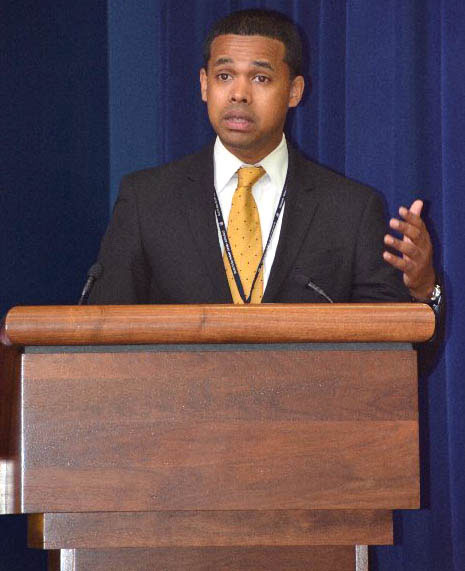
Paul Monteiro at the White House.
“This is perhaps the first time that such a collection of prominent Sikh business leaders has gathered at one place. It shows that as a community, we have generated wealth and jobs and proved our vitality,” said Dr. Singh.
Yet realizing Sikh financial clout was not the only reason for the event, as presentations from the White House Business Council and the Domestic Policy Council gave first-hand updates on policy initiatives, such as immigration reform bill that recently passed in the Senate.
For business, “there are three numbers that matter…immigration reform is projected to 5.4% to GDP from now to 2033, it is projected to cut $850 billion dollars from the federal deficit and it’s projected to add $350 billion dollars to our social security trust fund,” said Ari Matusiak, director of private sector engagement.
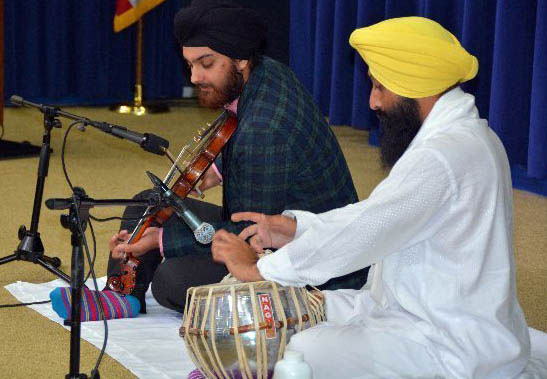
Violinder created an electrifying mood among the guests and they joined him in the musical celebrations.
Tyler Moran, deputy policy director on immigration, further expanded on the social realities of the Senate immigration bill as well. In the family area, green card holders can now sponsor their members immediately, the overall number of visas increased and the bill clears the backlog, which means all people who are waiting for a legal visa will now have a quicker process, she says.
With three weeks away from first anniversary of the tragedy that occurred at Oak Creek, Wisconsin, speakers wanted to give thanks to the Obama administration for all the support they have given to the Sikh community.
“At the end of the day, we are celebrating today our Sikh heritage and that identity is an identity this president truly does appreciate and respect in a lot of important ways,” says Amar Singh, a member of the White House Commission on Asian American and Pacific Islanders.
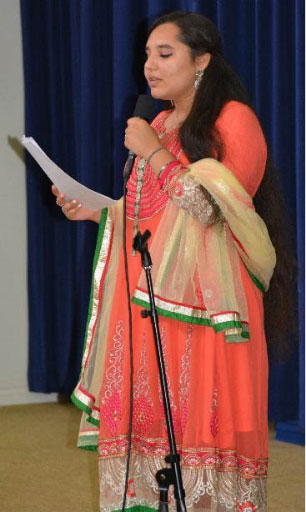
Sehejneet Kaur, singing a Punjabi song.
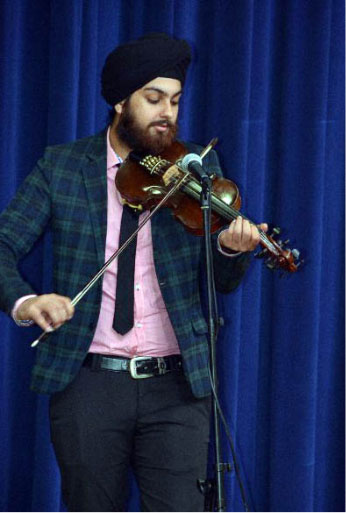
Violinder and Sucha Singh on Tabla presented a musical number based on Raag Bhimpilasi.
For the first time in over 30 years, three turbaned Sikhs were allowed to serve in the U.S. military under this administration in just a month.
“But the work is not over yet,” says Singh.
The event ended on a good note, as Sikh entrepreneurs reflected on their positive experiences within American business. Sunny Singh, president and CEO of Edifics, described his immigration to the United States and the challenges he faced as a businessman, going from near bankrupt to financial success.
His motto when things were down: “We must persevere, we must show the tenacity, we will work hard and we will have to focus to weather the storm,” he said.
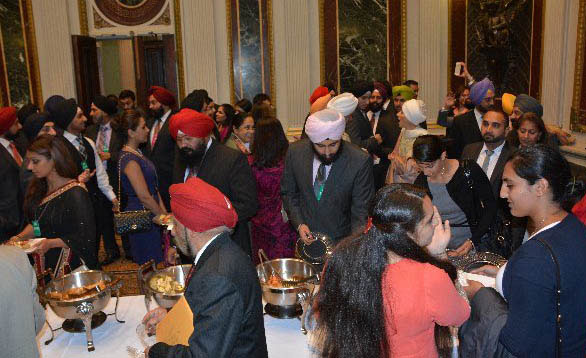
Sikh Business Leaders at a reception at the White House.
“Those are the values this country cherishes, encapsulates, appreciates and rewards. Those are the same values our Sikh religion espouses, appreciates and rewards.”
Rajinder “Violinder” Singh Momi and the University of Maryland Bhangra Team performed throughout the event, much to the delight of the audience. Sehejneet Kaur, college freshmen, sang in her melodious voice a Punjabi song, narrating the resilient spirit of Punjabis and Sikhs.
“For me the conference was a very positive one. The group had great positive energy and the take away was – how beautifully the community leaders are collaborating with with the various agencies and government bodies to address the challenges we as a community face. We desire collaboration to resolve issues and enable and power the community. At the same time appreciate the immense goodness there, opportunity that we have here in the USA. Full embodiment of Chardhi Kala.” – Kaval Kaur, CFO at Alert Enterprise, a security company in San Francisco.
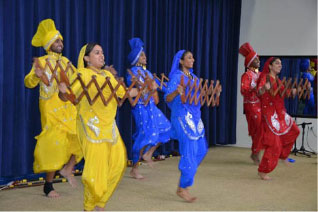
Dance and music were part of the festivities.
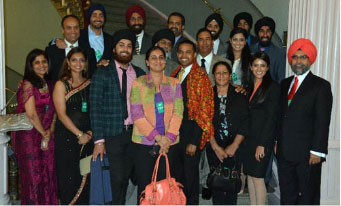
Paul Monteiro, (center) A White House official, was presented a Phulkari shawl, a Punjabi speciality.
Gurpreet ‘Sunny’ Singh, CEO, Edifecs Inc., a multi-million dollar company in Seattle, Washington, while speaking at the event, said, “American fully embraced me and gave me an opportunity to survive and thrive. Values of my faith, Sikhism and US founding principles, coincided to give me the strength to create an opportunity for myself.”
“The White House, in cooperation with the Sikh Council on Religion and Education, brought together so many Sikh American business leaders to celebrate the contributions of Sikh Americans over the last 100 years in the United States. Administration officials, including the Sikhs amongst them, and Sikh American citizens together frankly culled through the harsh lessons learned post 9/11 and the murders at Oak Creek; discussed the learning and initiatives needed by the Government and civil society to protect the civil liberties of all Americans including those who look in school and airport security lines; considered strategies needed to grow the contributions and standing of Sikh Americans in the United States; recognized the entrepreneurship, business acumen, and the collective financial clout of the Sikh American community; and felt profound pride to be an American when Sikh Kieran resonated loud and clear in the White House” said Indra Kaur Ahluwalia, founder and president of Development & Training Services, Inc. (dTS), a management consulting firm which focuses on the role of women and other underrepresented populations in economic development and democracy building activities.
Savneet Singh, CEO of Gold Bullion, a leading precious metals distribution platform based in Manhattan, said, “Being in America is one of the biggest advantages he had always felt and circumstances created opportunities for me to succeed and many of us. We must make sure that such opportunities and circumstances for others as well.” Savneet is the founder and president of GBI, the first electronic platform that allows investors to buy, trade and store physical precious metals. Savneet was recently named to the Forbes 30 under 30 list, Outstanding 50 Asian Americans in Business, in addition to the Impact 100 list of top 100 Entrepreneurs under 30.
Charanjeet Singh Minhas, CEO of Tekstrom , an IT company in Delaware, said, “The group of Sikh business leaders who met in the White House yesterday to discuss, evolve and improve the path of progress, equality and prosperity were left in no doubt that America is for You, Sikhs, and All.”
All the business leaders were invited for a dinner at Willard Intercontinental, a historic and prestigious hotel, across from the White House in honor of this celebration. This dinner was hosted by the Sikh Human Development Foundation, an organization providing scholarships to needy but bright students in Punjab.
Some of the prominent business leaders who were present: Tejinder Singh Bindra,NY, Lakhbir Singh,MD, Jasbir Singh, NC, Raminder Bindra, NJ, Harbinder Singh Sahni, NJ, Supreet Singh, IL, Billy Bath, CA, Harbir Bhatia, CA, Mayank Bawa, CA, Amitpal Singh, UT, Amarjit Singh, FL, Charanpreet Bagga, Darshan Singh Bagga, NY, Anita Gambhir, VA Baldeep Dua, NJ, Baljeet Bath, CA Balwinder ‘Dillon’ Dhillon, TX Bj Singh, CA, Bobby Saini,VA Bobby Singh, Charanbir S. Mahal, Charanpreet Bagga, Chattar Singh Saini, MD Darshan Singh Bagga, NY, Davinder Khanna, VA, Davinder Sawhney, Devinder Singh, MD Dickey Singh, CA Dr. Darshan Singh Sehbi, OH, Gagandeep Bhalla, Gunvir S. Baveja, VA Gurdarshan Singh Brar, TX, Gurmit Singh Bhatia, TX, Gurpreet Singh, Hardeep Singh Chadha & Ladi Chadha, MD, Jack Singh Jagwinder Singh Sikka, Jaswinder Singh Bindra Kanwal Taneja, Maninder Sethi, Mohinder Singh Taneja, NY, P. Singh Sandhu, VA Paramjeet Nagpaul, PA, Ranbir Singh Bhai, CA, Ravi Singh, MD and Sadhu Singh Rikhiraj, IL,
